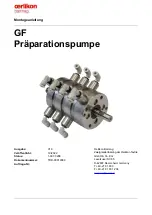
SHERPA SHW
Sanitary water heat pump
13
9.2
SAFETY INSTRUCTIONS
To prevent injury to the user, other people, or property damage, the following instructions must be followed. Incorrect operation
due to ignoring of instructions may cause harm or damage.
Install the unit only when it complies with local regulations, by-laws and standards. Check the main voltage and frequency. This
unit is only suitable for earthed sockets, connection voltage 220 - 240 V ~ / 50Hz.
The following safety precautions should always be taken into account:
-
be sure to read the following
WARNING
before installing the unit;
-
be sure to observe the cautions specified here as they include important items related to safety;
-
after reading these instructions, be sure to keep it in a handy place for future reference.
9.2.1
Warning
The unit must be securely fixed to avoid noise and shaking
: when insufficiently installed, the unit could fall causing
injury. The bearing surface should be flat to bear the weight of the unit and suitable for installing the unit without
increasing noise or vibration. In the place where there is strong wind, fix the unit in the location protected from the
wind.
When installing the unit in a small room, please take measures (like sufficient ventilation) to prevent the
asphyxia caused by the leakage of refrigerant.
Be sure to use the provided or specified parts for the installation work:
the use of defective parts could cause an
injury due to possible fire, electric shocks, the unit falling etc.
Do not tear off the labels on the unit:
the labels are for the purpose of warning or reminding, keeping them can
ensure your safe operations.
Indoor installation is compulsory:
it is not allow to install the unit at outdoor or rain achieving place.
The installation place without direct sunlight and other heat supplies is recommended:
if no way to avoid these,
please install a covering.
Make sure that there’s no obstacles around the unit.
9.2.2
Caution
Do not install the unit in a place where there is a chance of flammable gas leaks
: if there is a gas leak and gas
accumulates in the area surrounding the unit, it could cause an explosion.
Do not clean the unit when the power is ‘ON’:
always shut ‘OFF’ the power when cleaning or servicing the unit. If
not, it could cause an injury due to the high speed running fan or an electrical shock.
In case the unit is used without air ejection duct, verify that the installation room has got a volume not less than
20m
3
, with adequate ventilation.
Please note that the temperature of the expelled air is 5-10°C lower than the
inlet air, therefore if not channelled it can cause a significant lowering of the temperature of the installation room.
Do not continue to run the unit when there is something wrong or there is a strange smell:
the power supply
needs to be shut ‘OFF’ to stop the unit; otherwise this may cause an electrical shock or fire.
Inside the unit, there are some moving parts. Be especially careful when working near them, even if the unit is
off.
The temperatures of heads and exhaust piping of the compressor are usually high. Therefore be careful when
working near condensing coils.
The aluminum fins are very sharp and can cause serious injuries.
9.3
TRANSPORTATION
As a rule, the unit is to be stored and/or transported in its shipping container in upright position and without water charge. During
the transport (provided that it is done with care) and the storage, it’s advisable to not exceed an inclination angle of 30 degrees
max. If all possible precautions are taken in order the unit is not damaged, and only for transport on particularly short distances, it
is possible to position the unit horizontally. Particular attention must be taken during loading operations: all the machines must be
loaded and stowed in the truck interposing suitable spacers for safeguarding all protruding parts such as water connections and
resistance. Ambient temperatures of -20 to +70 degrees Celsius are permitted.
9.3.1
Transport using a forklift
When transported by a forklift, the unit must remain mounted on the pallet. The lifting rate should be kept to a minimum. Due to
its top-heaviness, the unit must be secured against tipping over. To prevent any damage, the unit must be placed on a level
surface.















































